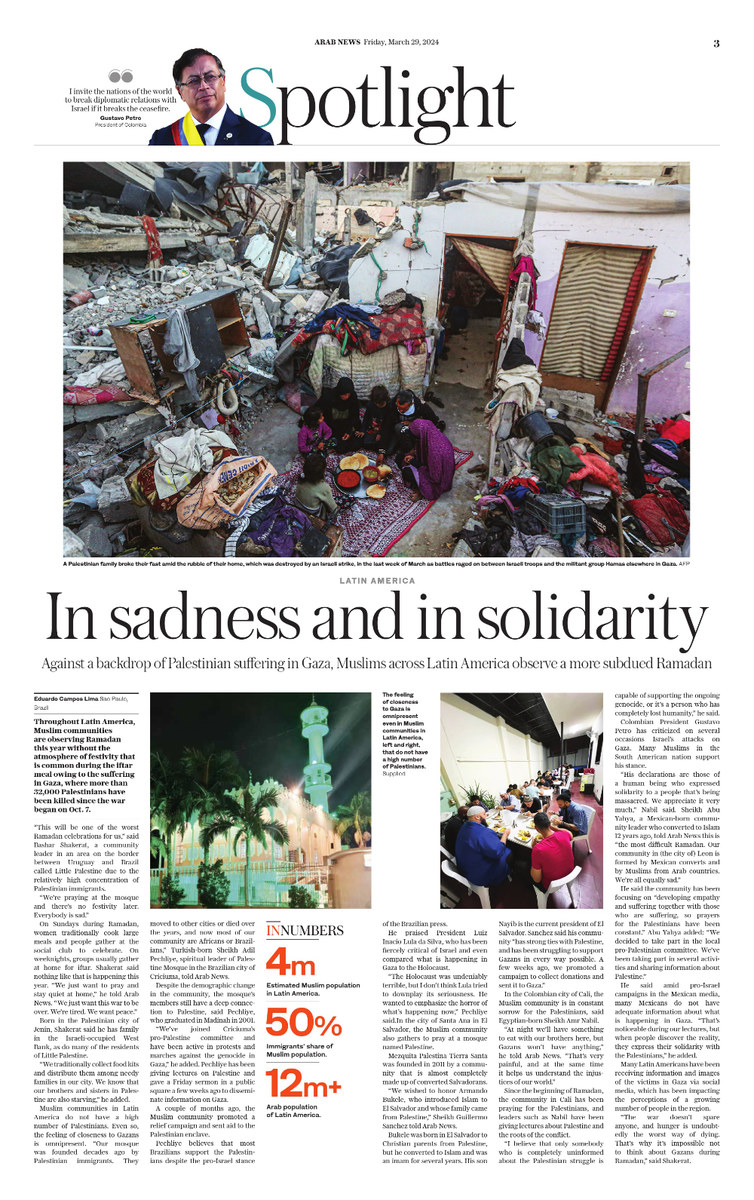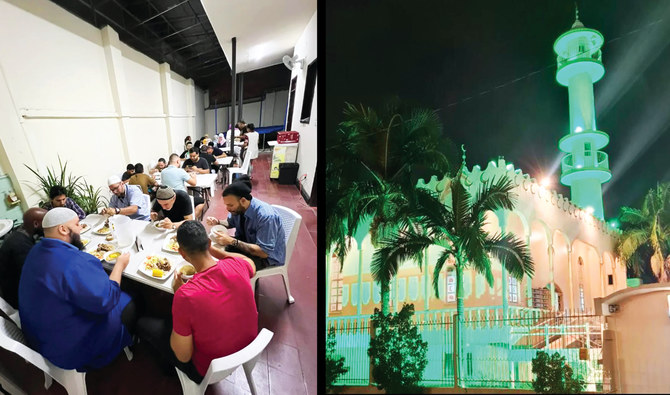SAO PAULO: Throughout Latin America, Muslim communities are observing Ramadan this year without the atmosphere of festivity that is common during the iftar meal owing to the suffering in Gaza, where more than 32,000 Palestinians have been killed since the war began on Oct. 7.
“This will be one of the worst Ramadan celebrations for us,” said Bashar Shakerat, a community leader in an area on the border between Uruguay and Brazil called Little Palestine due to the relatively high concentration of Palestinian immigrants.
“We’re praying at the mosque and there’s no festivity later. Everybody is sad.”
On Sundays during Ramadan, women traditionally cook large meals and people gather at the social club to celebrate. On weeknights, groups usually gather at home for iftar. Shakerat said nothing like that is happening this year.
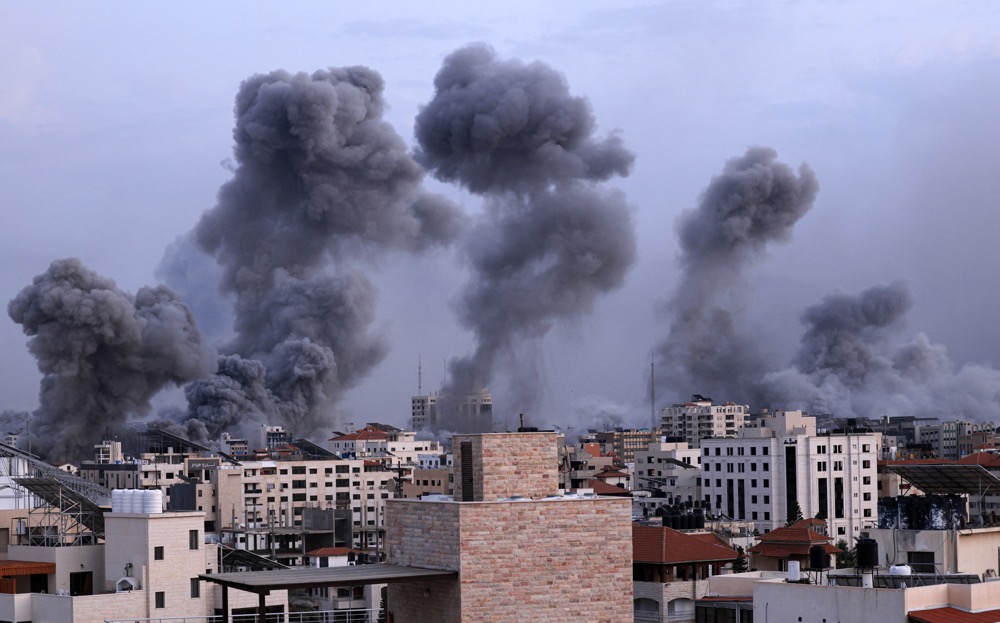
Smoke billows behind highrise buildings during an Israeli airstrike on Gaza City. (AFP)
“We just want to pray and stay quiet at home,” he told Arab News. “We just want this war to be over. We’re tired. We want peace.”
Born in the Palestinian city of Jenin, Shakerat said he has family in the Israeli-occupied West Bank, as do many of the residents of Little Palestine.
“We traditionally collect food kits and distribute them among needy families in our city. We know that our brothers and sisters in Palestine are also starving,” he added.
Muslim communities in Latin America do not have a high number of Palestinians. Even so, the feeling of closeness to Gazans is omnipresent.
“Our mosque was founded decades ago by Palestinian immigrants. They moved to other cities or died over the years, and now most of our community are Africans or Brazilians,” Turkish-born Sheikh Adil Pechliye, spiritual leader of Palestine Mosque in the Brazilian city of Criciuma, told Arab News.
Despite the demographic change in the community, the mosque’s members still have a deep connection to Palestine, said Pechliye, who graduated in Madinah in 2001.
“We’ve joined Criciuma’s pro-Palestine committee, and have been active in protests and marches against the genocide in Gaza,” he added.
Pechliye has been giving lectures on Palestine, and gave a Friday sermon in a public square a few weeks ago in order to disseminate information on Gaza.
A couple of months ago, the Muslim community promoted a relief campaign and sent aid to the Palestinian enclave.
Pechliye believes that most Brazilians support the Palestinians despite the pro-Israel stance of the Brazilian press.
He praised President Luiz Inacio Lula da Silva, who has been fiercely critical of Israel and even compared what is happening in Gaza to the Holocaust.
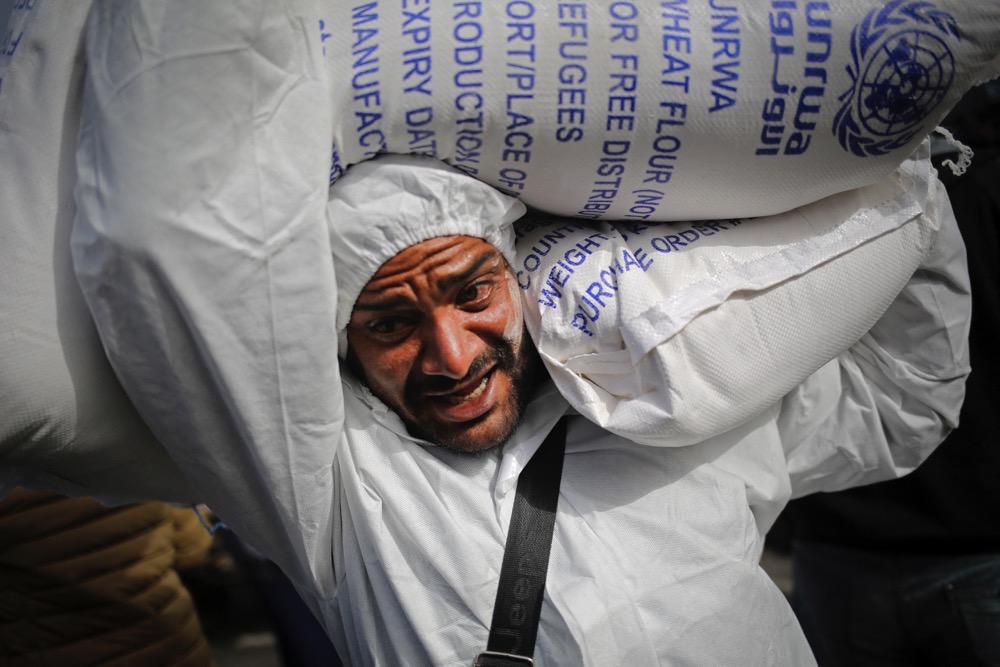
A Palestinian carries sacks of humanitarian aid at the distribution center of UNRWA. (AFP)
“The Holocaust was undeniably terrible, but I don’t think Lula tried to downplay its seriousness. He wanted to emphasize the horror of what’s happening now,” Pechliye said.
In the city of Santa Ana in El Salvador, the Muslim community also gathers to pray at a mosque named Palestine.
Mezquita Palestina Tierra Santa was founded in 2011 by a community that is almost completely made up of converted Salvadorans.
“We wished to honor Armando Bukele, who introduced Islam to El Salvador and whose family came from Palestine,” Sheikh Guillermo Sanchez told Arab News.
Bukele was born in El Salvador to Christian parents from Palestine, but he converted to Islam and was an imam for several years. His son Nayib is the current president of El Salvador.
Sanchez said his community “has strong ties with Palestine, and has been struggling to support Gazans in every way possible. A few weeks ago, we promoted a campaign to collect donations and sent it to Gaza.”
In the Colombian city of Cali, the Muslim community is in constant sorrow for the Palestinians, said Egyptian-born Sheikh Amr Nabil.
“At night we’ll have something to eat with our brothers here, but Gazans won’t have anything,” he told Arab News. “That’s very painful, and at the same time it helps us understand the injustices of our world.”
Since the beginning of Ramadan, the community in Cali has been praying for the Palestinians, and leaders such as Nabil have been giving lectures about Palestine and the roots of the conflict.
“I believe that only somebody who is completely uninformed about the Palestinian struggle is capable of supporting the ongoing genocide, or it’s a person who has completely lost humanity,” he said.
Colombian President Gustavo Petro has criticized on several occasions Israel’s attacks on Gaza. Many Muslims in the South American nation support his stance.
“His declarations are those of a human being who expressed solidarity to a people that’s being massacred. We appreciate it very much,” Nabil said.
Sheikh Abu Yahya, a Mexican-born community leader who converted to Islam 12 years ago, told Arab News this is “the most difficult Ramadan. Our community in (the city of) Leon is formed by Mexican converts and by Muslims from Arab countries. We’re all equally sad.”
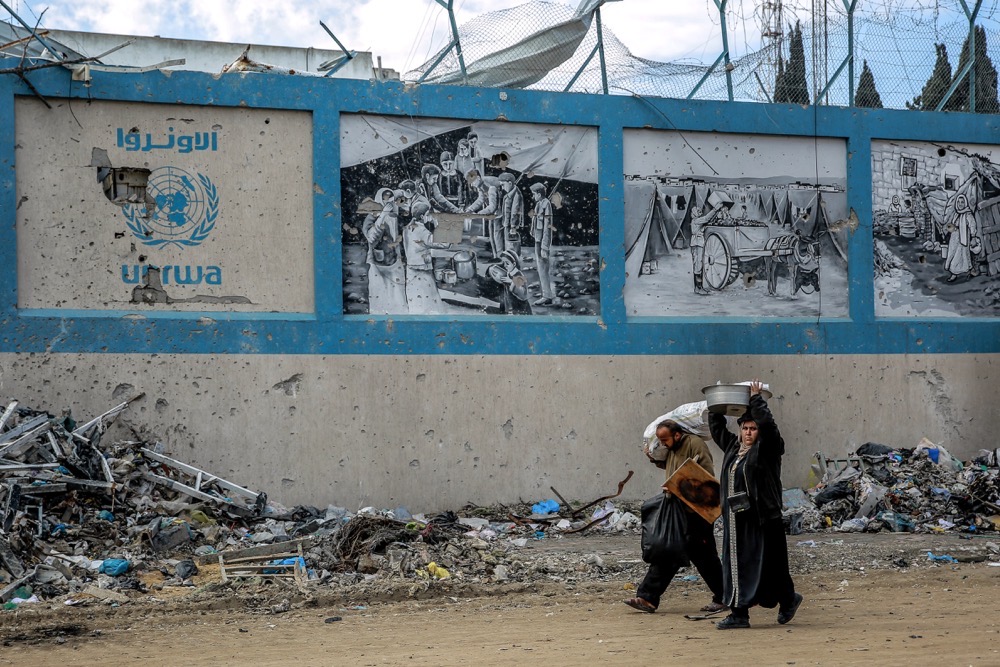
People walk past the damaged Gaza City headquarters of the United Nations Relief and Works Agency for Palestine Refugees. (AFP)
He said the community has been focusing on “developing empathy and suffering together with those who are suffering, so prayers for the Palestinians have been constant.”
Abu Yahya added: “We decided to take part in the local pro-Palestinian committee. We’ve been taking part in several activities and sharing information about Palestine.”
He said amid pro-Israel campaigns in the Mexican media, many Mexicans do not have adequate information about what is happening in Gaza.
“That’s noticeable during our lectures, but when people discover the reality, they express their solidarity with the Palestinians,” he added.
Many Latin Americans have been receiving information and images of the victims in Gaza via social media, which has been impacting the perceptions of a growing number of people in the region.
“The war doesn’t spare anyone, and hunger is undoubtedly the worst way of dying. That’s why it’s impossible not to think about Gazans during Ramadan,” said Shakerat.
